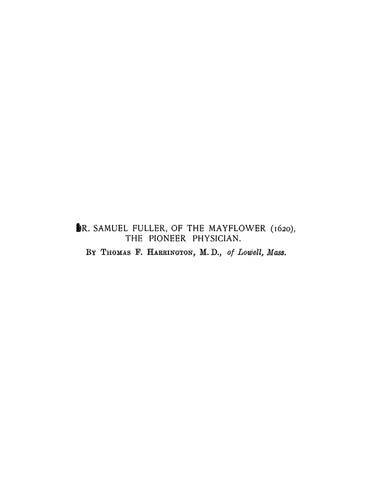
FULLER: Dr Samuel Fuller, of the Mayflower (1620), the Pioneer Physician (Softcover)
by Thomas F Harrington. 21p
In 1620, the Pilgrims aboard the Mayflower faced internal discord, leading to the signing of an agreement for unity to combat factionalism. Doctor Fuller, despite being sick himself, provided medical care to the Pilgrims without compensation, showcasing his dedication to their well-being. The Pilgrims' settlement in Plymouth was marred by sickness and deaths due to contagious diseases, with only a few individuals remaining healthy to care for the sick.
Doctor Fuller's medical services extended beyond treating the sick Pilgrims, as he also played a role in educating the community's youth. His will mentioned four youths entrusted to his care, emphasizing the importance of perpetuating learning among the children in the community. This act highlights Doctor Fuller's commitment to the future welfare of the community by ensuring the education and well-being of its younger members. Additionally, the will provides valuable insights into Doctor Fuller's life, work, and character, serving as a testament to his significant contributions to the early Plymouth settlement.
Governor Endicott sought Doctor Fuller's medical expertise in Salem, showcasing the physician's reputation and influence in the region. Doctor Fuller's visits to the Endicott Settlement had a profound impact on the early progress of the country, although the full extent of this influence remains underexplored. Despite facing challenges and disappointments in England over the results of the Plymouth settlement, Doctor Fuller's dedication to providing medical care and education to the community exemplifies his crucial role in shaping the early history of the region.
